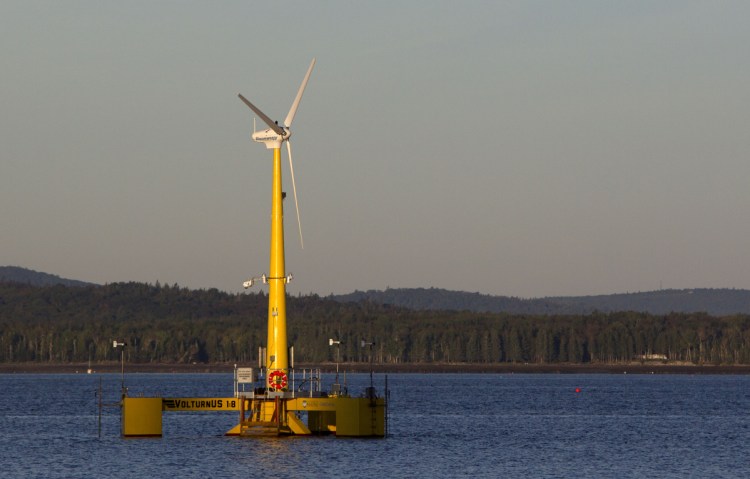The Maine Public Utilities Commission usually sets prices for electricity, natural gas, telecommunications and water systems. It’s not every day that it also regulates the state’s credibility.
But that’s what will be happening when the PUC reconsiders a power purchase agreement it signed in 2013 with Maine Aqua Ventus, a public-private partnership involving the University of Maine that is trying to develop the nation’s first deep-water wind power generator.
The three PUC commissioners, all appointed by Gov. LePage since the power purchase agreement was signed, question whether Maine ratepayers should have to pay higher-than-market prices for electricity that’s produced by the demonstration project, and they’ve hinted that they could pull Maine out of the contract.
They say they would be looking out for Maine consumers, who could save as much as 73 cents a month on their electric bills. But those savings would come at a tremendous cost.
SINKING OFFSHORE WIND
Ripping up the contract would probably kill the project. In addition to losing the money from the energy sales, it would almost certainly result in the loss of $87 million in grant money from the U.S. Department of Energy aimed at getting this technology ready to market commercially.
The end of this project would be bad news not only for the Maine Aqua Ventus partners. It would also hurt the Maine companies that would have helped build and supply a new manufacturing facility, and it would be bad news for the people who would have been hired to fill newly created jobs.
But the biggest loser would be Maine itself. A decade-long effort to take a leadership role in a home-grown energy industry – one that could sell clean power to states that don’t have the capacity to make their own – would go down the drain. To save consumers that potential 73 cents a month, the state would throw away millions already invested, including an $11 million bond (which passed in 2010 with nearly 60 percent of the vote).
LOST CREDIBILITY
The ultimate price would come at the expense of the state’s credibility as a business partner, giving investors a very good reason to look elsewhere before deciding to put their money to work here. They would have to doubt whether Maine could be trusted to keep its word through inevitable shifts in the political climate. That’s not a good position to be in for a state that cites a lack of capital as an obstacle to economic growth.
The agreement looks fairly straightforward: Maine Aqua Ventus would build a 12-megawatt wind project off Monhegan Island, and the PUC agreed that the company commits the state’s ratepayers to buy the electricity it produces at 23 cents per kilowatt-hour in the first year, or as much as $187 million over 20 years.
That price is roughly three times the average price of power now, which, to some eyes, makes the agreement look like a bad deal for Maine.
But this is not just a power purchase agreement – it’s also a research and development project.
PAYING FOR R&D
The over-market energy sales enables Maine Aqua Ventus to develop a new technology – floating platforms for wind-driven turbines – and prove that it can work. The Legislature envisioned this financing system a decade ago when it created the Ocean Energy Task Force in 2009 and adopted its recommendations in statute a year later. The law set a limit on how much the research project could add to electric bills, and this term sheet is below the limit.
This is not the only source of revenue for this project. It has been heavily subsidized by the federal Energy Department, as well as Maine taxpayers, who have approved two bonds.
And while the kilowatt-hour price is high, the amount of energy that ratepayers would have to buy from this experimental project is very small. It’s likely that consumers would not see any noticeable change in their electric bills because of this project.
What they are more likely to see is the economic benefit that would come from Maine becoming a supply hub for an emerging industry. Private companies would buy made-in-Maine equipment or license patented technology that is being developed here. The university would cement its status as a leader in the field, making it eligible for more federal research funds that percolate in the state’s economy.
LOST OPPORTUNITY
But what do we get if the PUC pulls its support?
Five years ago, Maine gave itself a black eye by reneging on a power purchase agreement with Statoil, the Norwegian energy business, which was working on a different ocean wind idea.
The company took its $120 million and invested it in Scotland instead of Maine. If the PUC repeats that sorry episode, the damage to Maine’s reputation will be complete.
Anything as complicated as the transition from fossil fuels to renewable energy will take time. It can’t be accomplished by one Legislature or one governor. Leaders come and go, but the commitments they make to a shared vision should not shift with the political winds.
Maine has put too much into ocean wind power to abandon it. The PUC should not sink this proposal, or the state’s credibility.
Send questions/comments to the editors.


